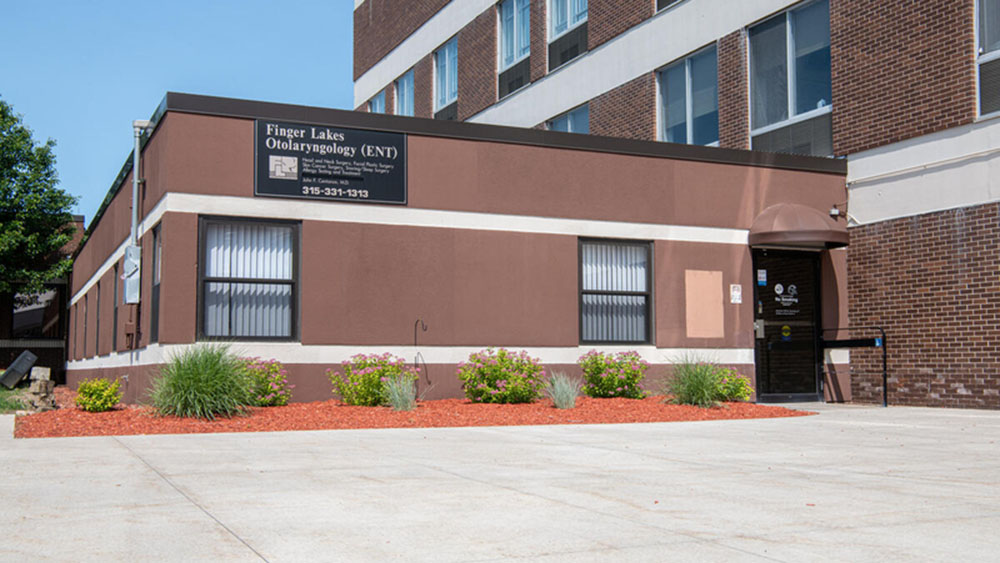Evidence-Based Care for Thyroid Disorders
Your thyroid plays a key role in your body by secreting a hormone called thyroxine that controls common metabolic activities. Millions of people in the United States are affected by thyroid conditions like hyperthyroidism and hypothyroidism, which can affect their quality of life. The ENT thyroid specialists at Rochester Regional Health closely adhere to the American Thyroid Association's evidence-based guidelines for the management of thyroid nodules, which helps us provide the best possible care.
What is Your Thyroid?
Your thyroid is a gland shaped like a butterfly that sits low on the front of your neck. It is found below your Adam's apple, along the front of the windpipe, and has two side lobes that are connected by a bridge called the isthmus. Even when your thyroid is functioning normally, you can still have nodules that need to be evaluated.
The thyroid is rich with blood vessels and nerves. Nerves that play an important role in voice quality pass through it. Thyroids secrete several hormones called thyroid hormones. They act throughout your body, regulating body temperature, influencing metabolism, and helping with growth and development. Throughout childhood, adequate levels of thyroid hormones are crucial for brain development.
Our Thyroid Services
Our ENT surgeons use the latest in diagnostic and treatment options to create an individualized care plan right for each patient. In most cases, diagnosis begins with an ultrasound guided biopsy, which can be done right in the office by one of our accredited providers for a timely and accurate diagnosis. Our minimally-invasive, minimally-scarring techniques allow us to provide the most comprehensive care in Rochester.
Common thyroid conditions we treat include:
- Thyroid cancer
- Goiter
- Thyroid nodules
- Graves disease
Thyroid Cancer
There are several different types of thyroid cancer, some more aggressive than others but most thyroid cancers can be treated with high cure rates.
- Papillary thyroid carcinoma - This is the most common type of thyroid cancer seen in all ages. Prognosis is excellent with early detection and appropriate treatment.
- Follicular thyroid carcinoma - This is found in the middle age population most frequently and tends to spread via vessels. Prognosis is still good with surgery and iodine therapy.
- Medullary thyroid carcinoma - This is often a genetic thyroid carcinoma passed down through families but can happen sporadically. This cancer is more aggressive and usually neck dissection is required.
- Anaplastic thyroid carcinoma - This is a rare, very aggressive thyroid cancer. A rapidly expanding thyroid mass is common and evaluation should be emergent.
Learn more about our Head and Neck Cancer Program
Our expert physicians will assess your unique symptoms and carefully diagnose any thyroid condition. From there, we'll create a personalized treatment plan focused on your lifestyle and your condition.
Our Thyroid Treatments
A wide spectrum of medical and surgical treatment options are available for both children and adults to address thyroid disorders. The treatments we offer include:
Thyroid Surgery (Partial or total thyroidectomy with or without neck dissection)
During thyroid surgery, your ENT surgeon will remove part or all of your thyroid. Thyroidectomy is performed for goiters, hyperthyroidism, and thyroid cancer.
Radioactive iodine
Radioactive iodine can be used in small doses to destroy an overactive gland or test for residual tissue. Larger doses are used to destroy cancerous tissue after surgery.
External radiation
Occasionally your ENT physician will consult radiation oncologists to deliver radiation to your thyroid to eradicate cancer cells.
Parathyroid
The parathyroid glands are integral to calcium metabolism in your body. They are intimately related to the thyroid gland and secrete parathyroid hormone (PTH) which regulates calcium absorption in your kidneys and gut. Everyone has 4-5 glands. Sometimes one or more glands can overproduce PTH which causes excess calcium retention leading to kidney stones and osteoporosis.
We provide a comprehensive treatment plan and locate these parathyroid tumors through special imaging. This allows for more precise surgical removal through smaller incisions. During surgery, we'll test PTH levels to insure that all hypersecreting glands have been removed. The national cure rate for hyperparathyroidism is 95%.








